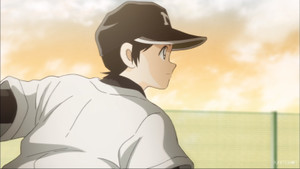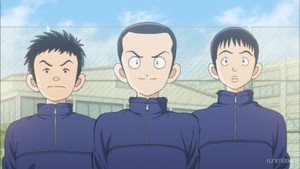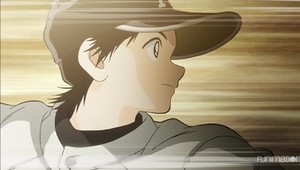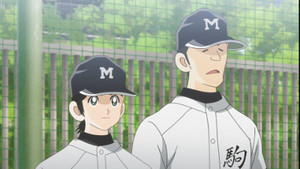The Spring 2019 Anime Preview Guide
Mix
How would you rate episode 1 of
Mix: Meisei Story ?
Community score: 2.9
What is this?
 In this sequel to the 1985 manga Touch, Touma and Souchiro Tachibana are brothers and aspiring baseball players who dream of bringing the Meisei High School baseball team to the national championships, also known as the Summer Koshien. They're still at Mesei Junior High, however, and they're joined this year by their supportive and outspoken younger sister, Otomi. It's been over thirty years since Meisei High made it to the Summer Koshien, and the shadow of that victory looms large over the Tachibana siblings. Will Touma and Souchiro be able to accomplish what no other players have in decades and live up to the Meisei High School legacy? Mix is based on a manga and streams on Funimation and Hulu, Saturdays at 7:00 AM EST.
In this sequel to the 1985 manga Touch, Touma and Souchiro Tachibana are brothers and aspiring baseball players who dream of bringing the Meisei High School baseball team to the national championships, also known as the Summer Koshien. They're still at Mesei Junior High, however, and they're joined this year by their supportive and outspoken younger sister, Otomi. It's been over thirty years since Meisei High made it to the Summer Koshien, and the shadow of that victory looms large over the Tachibana siblings. Will Touma and Souchiro be able to accomplish what no other players have in decades and live up to the Meisei High School legacy? Mix is based on a manga and streams on Funimation and Hulu, Saturdays at 7:00 AM EST.
How's Funimation's SimulDub?
Not every character suffers from this issue, thankfully. Kyle Phillips does just fine as Kosaku, since he at least sounds like he's in the ballpark of his pre-teenage years. Admittedly, after watching a couple of episodes, I got more used to everyone's performances, so it isn't like the dub is a deal breaker or anything. In either language, the Tachibana siblings have a chemistry that makes them come across like real kids, and that rapport still shines through in English, even when some of the voices' timbres may convince you otherwise. I feel the Japanese audio will be the way to go for most fans, but the English audio could work in a pinch. -- James Beckett
How was the first episode?
 Nick Creamer
Nick Creamer
Rating:
Mix was one of my most anticipated titles coming into this season, based entirely on the brilliance of its manga creator, Mitsuru Adachi. Adachi's Cross Game is one of my all-time favorite manga, and the mangaka has a general reputation for creating extremely similar coming-of-age sports narratives that are as well-crafted as they are kinda identical. His works are acclaimed in Japan, but have never really broken through elsewhere, and so I was excited to at last see a fresh Adachi production from the start.
This first episode served as a fine reminder of both Adachi's storytelling chops, and also his tendency to recycle major components of his stories. This episode was full of narrative conceits and storytelling flourishes that were also featured in Cross Game, from Adachi's tendency to play with the fourth wall (one character is introduced reading a manga compendium advertising Mix itself), to the resolutely antagonistic old guard keeping our would-be pitcher down. The episode moves with great confidence through the introduction of its leads and their middle school team, letting Adachi's terrific ear for naturalistic dialogue guide the course of the drama. The familiarity of Adachi's narratives, and their natural embodiment of coming-of-age drama fundamentals, isn't really a weakness; reading or watching his stories is like watching a master actor run through a scene they've performed a thousand times before, with the knowledge and confidence built through each performance coming through clearly in the final result.
While I was fully invested in this episode's narrative, the pacing felt a little slow to me. What would likely come off as breezy incidental conversations in narrow panels felt stilted in motion, with lots of dead air between statements, and a whole bunch of compositions that were clearly just small panels converted into full shots. One of Adachi's greatest talents is his mastery of dramatic paneling, so it was disappointing to see this adaptation take such a literal approach to depicting them, often leading to the sense of watching a manga being read very slowly. I also wasn't really sure what to make of this episode's ostentatious visual ornamentation - the episode would occasionally mess with the picture as if it were adjusting a film reel, but I didn't really see how choices like that actually improved the production.
On the whole, while this was a perfectly fine episode, it felt like everything it did well was a result of strong source material, with the adaptation itself not really adding anything. Given this anime's awkwardly loyal approach to conveying Adachi's panels, I feel like I'd be better off just reading the actual source material. As a result, Mix gets a thumbs up from me if you're interested in a more thoughtful, atmospheric style of sports drama, but my biggest takeaway is “please publishers, license more Adachi manga!”
 Rebecca Silverman
Rebecca Silverman
Rating:
Mix is a loose sequel to another of Mitsuru Adachi's baseball manga series, Touch, but while knowledge of it might give you a few insights to this story, I don't think it's really necessary to have seen or read the earlier tale. Although there are characters related to those in the previous work, the first episode of Mix does a good job relying solely on its own cast, instead just tossing out a few references to the events of the former series. In fact, not having experienced Touch might make the heavy-handed narration of Mix somewhat less annoying, although honestly that's a toss-up.
In any event, this is very much a prologue kind of episode. We're introduced to brothers Touma and Souichiro (AKA Tou and Sou) and their one-year-younger sister Otomi, all of whom are in middle school. The boys, who are the same age and share the same birthday but aren't twins (and doesn't that sound like a bad riddle?), are both on the baseball team, with Tou as third baseman and Sou as catcher. While they're both good at what they do, it's clear that Tou would much rather be, and is better suited to be, pitcher – but for some reason a big third year named Daisuke has that honor. At first it seems like that's just how it is, but mild suspicions are given full voice when the coach tests out new first years who want to pitch and then quickly assigns the best one to the outfield – a clear snub. When the coach then leaves and Tou immediately begins practicing his own pitches with his brother, it's apparent that the coach is deliberately keeping talented pitchers off the mound in order to keep Daisuke ensconced there. It isn't hard to put the pieces together from there: when Tou and Sou were walking to school, they saw Daisuke get out of a chauffeured car and gave him deeper bows than you'd expect of teammates. Clearly Daisuke's related to someone with major influence (i.e. wealth) and everyone else is, if not precisely suffering from it, at least being swept aside for his benefit.
That would appear to be the first plot point for Mix, which with fourteen-odd volumes and an Adachi pedigree may have the luxury of getting to take its time developing things. If this is about the Touch kids' kids getting back to Koshien, that means that not only does Tou need to be allowed to take his rightful place as pitcher, but also the boys need to actually make it to high school, and they're only second-years as of now. While this episode is kind of slow moving, I'd rather see the series take its time, because one of Adachi's greatest strengths as a storyteller is how he develops his characters and makes you care about what happens to them. That's not to say that the baseball itself won't be important, but we need to understand where the brothers are coming from too, and a slower pace would better suit that, especially given this episode.
That said, this may be too slow for some viewers, because honestly not much happens and the narration is really off-putting. The suspicion that a romance may be brewing between Otomi and one of the brothers also may be an issue, although that's just my speculation at this point and is just hopefully the result of me having Seen Too Much. But if you're up for the long game or a baseball anime that isn't just about the sport, this is worth checking out.
 Theron Martin
Theron Martin
Rating:
I am not generally a fan of sports anime, but the one major exception is Cross Game, a story about love, loss, and baseball which I would call one of the greatest anime of the 2000s, with the most emotionally potent first episode (and one of the strongest finales) I've ever seen in anime. That's highly relevant because Cross Game, like Mix, is based on a manga by Mitsuru Adachi, which should be immediately obvious to anyone who has seen both series. Indeed, the character designs between the two titles are so similar that it almost looks like the cast of Cross Game was just ported over and reskinned to populate the cast of this one. (It's also worth noting that Mix is a spinoff of Adachi's even earlier baseball manga Touch, which portrays the 1986 trip to Koshien described in the narration and flashbacks; Adachi borrowed heavily from it for Cross Game as well.)
The inescapable comparison to Cross Game doesn't do Mix's first episode any favors. It definitely does not start out like the powerhouse that was Cross Game, although admittedly that's a high bar for comparison. Instead, this is generally a more lighthearted introduction that focuses on establishing the the setting and premise. Two step-brothers on a middle school baseball team have the talent to form an excellent battery, but their pitcher is being overlooked in favor of the scion of a wealthy family. The implication is that the coach may be beholden to higher powers on this one, as he also ignores an incoming first-year who has considerable talent as a pitcher, and baseball isn't being taken seriously enough at their school for the team to return to Koshien after a 30-year absence. Hence there's a fair amount of potential for drama going forward. The first episode also remains dodgy about the relationship of the Tachibana brothers; they're indicated to have been born at different hospitals but only a few minutes apart, which suggests that either one is adopted or they are stepbrothers who came to live together when one's father married the other one's mother. (The other option – that the father almost simultaneously impregnated two women – seems unlikely.)
There's also at least some potential for romance. The hotshot newcomer has an interest in the brother's younger sister, and she seems to have a passion for watching the brothers play baseball. She's also designated as one of the protagonists, so we'll have to see how that shakes out. The technical details on the baseball pitching are expected for a series like this, though the animation as a whole isn't anything spectacular. Overall, the first episode isn't bad by any means, it has some interesting gimmicks like being framed as a video that is occasionally fast-forwarded, and it certainly establishes its premise well, so it's off to a relatively solid start. It's just not on the level of its predecessor yet.
 James Beckett
James Beckett
Rating:
I don't normally go out of my way to read sports manga, so I was unaware of Touch, the manga from the 80s that Mix is serving as a follow-up to. I was able to catch on to the fact that I was meant to have some kind of knowledge of a story that came before this one pretty early on, however. All throughout this premiere, there's talk of the Meisei school's legacy as champions, and how nobody has been able to live up to it in the decades since. There are plenty of stories that start from scratch with premises like this, but Mix has an especially powerful air of wistful nostalgia, combined with the burden of unspoken expectations, so I was unsurprised to learn about its connection to Touch when I did a bit of follow-up reading for this review.
This would also explain the strange treatment of the brotherly ties between two of our three protagonists, Touma and Souchiro. The opening scene of the premiere establishes the two as they argue about who gets to be classified as the older brother, despite being born on the same day, which is classic “twins banter”, so I was just as surprised as Ichiban was later on when the show goes out of its way to clarify that the brothers are not twins. According to the summary on the Funimation blog (mild potential spoilers incoming), Souchiro and Touma are step-brothers who just happened to be born on the same day, but I was distracted as to why Mix would play this up as such a mystery in its first episode without offering any further context for it. Then I learned that the protagonists of Touch were twins, and I realized that Mix was just playing with fans' expectations of the formula.
Despite making some choices that could serve as contextual speedbumps for viewers who aren't in the know about the original series, Mix's premiere ended up being surprisingly enjoyable for me, seeing as I'm ambivalent about baseball in general. A lot of this has to do with the show's stylish presentation – flashback scenes incorporate a worn-out-VHS aesthetic that transitions nicely to the more modern HD visuals. The eye-catching scene transitions and appealing animation liven up an otherwise low-key script, and the narrator was pretty charming too. The one element of this episode didn't work for me as well was how disconnected I felt from the main characters. Souchiro and Touma both posses a certain aloofness that I found hard to engage with. Otomi seems like a nice enough character on her own, too, but she also barely gets anything to do, and the same can be said of all the side-characters who get introduced this week. In my experience, longer running series like Mix tend to take a slow-burn approach with developing their casts, so I'm hoping Mix's story improves over the course of the season.
You'll also have to forgive my pun, but Funimation's dub is also a mixed bag. Most of the main cast are turning in decent performances: Dani Chambers is sweet and spunky as Otomi, and Howard Wang is the more natural sounding of the brothers as Touma. Clifford Chapin is also doing good work as Souchiro, but his vocal quality reflects an issue I had with the dub overall, which is that everyone sounds too old for their parts. I know that 99% of anime these days feature young teenagers being played by grown adults, but that wistful quality of Mix's doesn't spark as well as it ought to when everyone in the show sounds at least a decade older than the characters they are portraying. Daisuke, the teams' ace player, is the most egregious example of this – with Josh Bangle's voice, he sounds like a middle-aged man, and I genuinely could not believe that he was supposed to be a middle-schooler.
Overall, I enjoyed Mix more than I expected to. I don't know if I'll be keeping up with it on a regular basis this Spring, but I think I'll at least give it a couple of more episodes to show me what its got. If you're a fan of sports anime, or if you're familiar with the original Touch manga, I'd say you should give Mix a shot.
discuss this in the forum (214 posts) |
this article has been modified since it was originally posted; see change history
back to The Spring 2019 Anime Preview Guide
Season Preview Guide homepage / archives